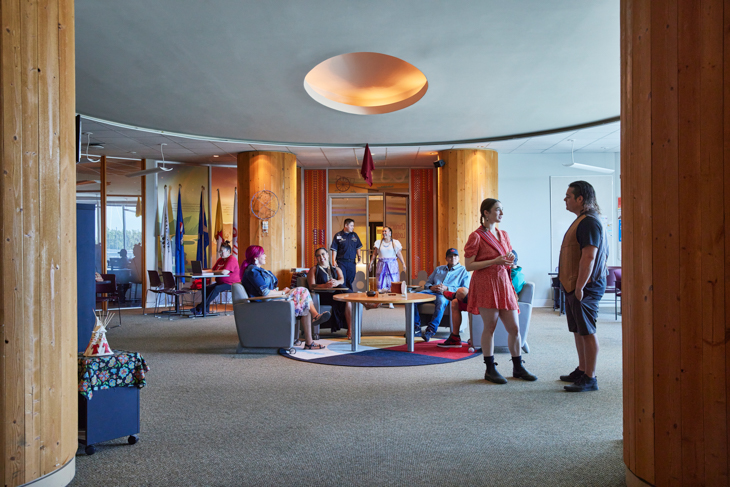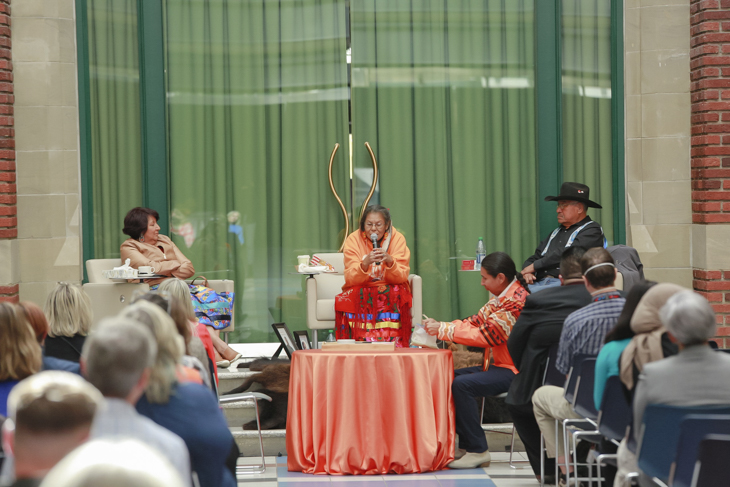Meaningful conversation is the central theme at SAIT's Truth and Reconciliation Event Series

Join the campus community to reflect on the individual and collective steps we’re taking towards Truth and Reconciliation
National Day for Truth and Reconciliation, September 30, is a time for transparent education and to think deeply about reconciliation. It’s an opportunity for Canadians to recognize and reflect on the lasting impact of our country’s colonial history.
Monday, Sept. 30 is also Orange Shirt Day, a time to reflect on the injustices of the residential school experience, as well as honour those who didn’t make it home, the survivors and their families.
From Sept. 23 – Oct. 4, Natoysopoyiis will host the second annual SAIT Truth and Reconciliation event series to reflect our community’s commitment to an inclusive and culturally sensitive learning environment. SAIT will also be closed on Monday, Sept. 30 to allow students and employees to take part in learning and reconciliation activities.
All members of the SAIT community are encouraged to take part in the on-campus learning opportunities — including a Reconciliation Round Dance and Every Child Matters March. Please register as spots are limited.

Schedule of events 📅
The event series will give the SAIT community an opportunity to celebrate Indigenous culture, share success stories and engage in meaningful conversations to gain deeper insights into Indigenous and Canadian histories, experiences and perspectives.
- Raising the Survivors’ Flag | Monday, Sept. 23
The Survivors’ Flag is an expression of remembrance to honour residential school survivors and all lives and communities impacted by Canada’s residential school system.
- Reconciliation Round Dance | Monday, Sept. 23
A round dance is a special tradition in First Nations culture where participants come together and hold hands as they dance in a circle to symbolize healing and honour and celebrate life.
- Kairos Blanket Exercise | Tuesday, Sept. 24
Based on Indigenous methodologies, the exercise can build understanding into the shared history of Indigenous and non-Indigenous peoples in Canada by walking through pre-contact, treaty-making, colonization and resistance.
- Exploring the Use of Land Acknowledgment in Post-secondary Institutions | Tuesday, Sept. 24
This session will be led by Delia Cudney and Reverend Tony Snow. Focused on understanding of settler's role in reconcili-action, we’ll discuss the history of land acknowledgements and the importance of personalizing an acknowledgement as a small step in reconciliation.
- 60s Scoop: A Survivor’s Story | Wednesday, Sept. 25
This session will be led by Michaela Lewis, SAIT Film and Video Production student. A survivor of the 60s scoop, she was taken at birth and illegally adopted to a non-Indigenous family until she was reunited with her birth family at 18.
- Supporting Hope: Missing and Murdered Women | Thursday, Sept. 26
This session will be led by Sheila Rogers and Dorthea Swiftwolfe. As a Victim Services Coordinator and Missing Person Liaison with the Saskatoon Police Service, Swiftwolfe will share her experiences and offer proactive measures for keeping campus safe, building community awareness and how to best support students and families.
- Indigenous Truth – Residential and Day Schools | Thursday, Sept. 26
This session will be led by Sheila Rogers and Dorthea Swiftwolfe, a Cree woman from Peter Ballantyne Cree Nation and mother to eight beautiful children. She’ll share her experience navigating life challenges of family members who have experienced day schools and residential schools.
- Every Child Matters March | Friday, Sept. 27
Members of the community are encouraged to wear orange shirts and join the march in recognition of National Day for Truth and Reconciliation and acknowledgement of Every Child Matters — to honour the children who never made it home from residential schools across Canada.
- National Day for Truth and Reconciliation | Monday, Sept. 30
The institution will be closed to allow students and employees to take part in learning and reconciliation activities.
- Indigenous Women's Leadership | Tuesday, Oct. 1
This session will be led by Elder Alice Kaquitts and Knowledge Keeper Shalome Hope, who will share their experiences as Indigenous women in leadership.
- Métis – The Forgotten People | Wednesday, Oct. 2
This session will be led by Elder Victoria Norris. The Métis were referred to by some as the “forgotten people” after the 1885 Northwest Resistance and until the 1980s. Norris will cover the history and battle for recognition and autonomy of the Métis people.
- Missing and Murdered Indigenous Women, Girls and Two-Spirit | Thursday, Oct. 3
This session will be led by Awo Taan Healing Lodge along with surviving family members and advocates for Missing and Murdered Indigenous Women, Girls and Two-Spirited Peoples.
- Sisters in Spirit Missing and Murdered Indigenous Women, Girls and Two-Spirit Vigil | Friday, Oct. 4
Awo Taan Healing Lodge host a vigil and march in downtown Calgary. SAIT employees are invited to attend and march for justice and awareness. Please wear red in honour of the families and survivors.
Access Indigenous supports at Natoysopoyiis
Natoysopoyiis is a space for Canadian Indigenous learners at SAIT to connect with their peers, meet with Elders for cultural and spiritual advising, participate in ceremonial smudgings, and receive onsite advising and counselling.
This space isn't just open to Canadian Indigenous learners — all members of the SAIT community are encouraged to come by to learn about First Nations, Métis and Inuit histories and cultures.

Oki, Âba wathtech, Danit'ada, Tawnshi, Hello.
SAIT is located on the traditional territories of the Niitsitapi (Blackfoot) and the people of Treaty 7 which includes the Siksika, the Piikani, the Kainai, the Tsuut’ina and the Îyârhe Nakoda of Bearspaw, Chiniki and Goodstoney.
We are situated in an area the Blackfoot tribes traditionally called Moh’kinsstis, where the Bow River meets the Elbow River. We now call it the city of Calgary, which is also home to the Métis Nation of Alberta.